| [story] [Leo Tolstoy] [cast & staff] [production] [critics] [posters] [links] |
| ANNA KARENINA |

| STORY |
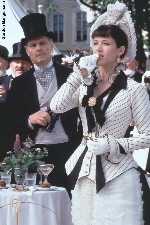 given
her respectability, wealth and social position, but it lacks the passion
and love that she also desires. It is no wonder she responds to the advances
of the charming Vronsky, but their subsequent affair
shocks society, and has tragic consequences. Anna is banished from
her social circle and forced to live in splendid rural isolation with her
illicit lover, while the scorned Karenin also bans her from seeing their
young son. Then at tale's end Anna meets her fate under the locomotive's
wheels, the audience feels some tragedy, but with the suspicion that the
train arrived ahead of schedule.
given
her respectability, wealth and social position, but it lacks the passion
and love that she also desires. It is no wonder she responds to the advances
of the charming Vronsky, but their subsequent affair
shocks society, and has tragic consequences. Anna is banished from
her social circle and forced to live in splendid rural isolation with her
illicit lover, while the scorned Karenin also bans her from seeing their
young son. Then at tale's end Anna meets her fate under the locomotive's
wheels, the audience feels some tragedy, but with the suspicion that the
train arrived ahead of schedule.
| LEO TOLSTOY (1828 - 1910) |
| CAST & STAFF |
| SOPHIE MARCEAU |
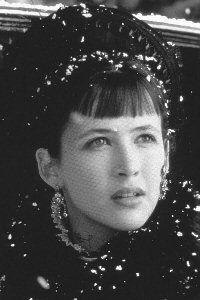 The filmmakers immediately recognized the importance
of finding the ideal actors to play the roles that have captured generations
of readers the world over. Director of this film Rose
said:"...so we needed to find an Anna who could communicate a
great deal without a history -- who had a gorgeous, eloquent face and a
mystery about her, aristocratic yet vulnerable. A woman who could drive
a man to a grand, dangerous adoration, but who seemed to live without any
calculation. Mel Gibson had worked with Sophie Marceau on 'Braveheart'
and he suggested that we meet with her." In that time, Sophie had recently
had a baby, and Rose felt that this enhanced her qualification for the
role even more.
The filmmakers immediately recognized the importance
of finding the ideal actors to play the roles that have captured generations
of readers the world over. Director of this film Rose
said:"...so we needed to find an Anna who could communicate a
great deal without a history -- who had a gorgeous, eloquent face and a
mystery about her, aristocratic yet vulnerable. A woman who could drive
a man to a grand, dangerous adoration, but who seemed to live without any
calculation. Mel Gibson had worked with Sophie Marceau on 'Braveheart'
and he suggested that we meet with her." In that time, Sophie had recently
had a baby, and Rose felt that this enhanced her qualification for the
role even more.
Sophie Marceau had a splendid performance. Besides her ineffable beauty and exquisite elegance reflected on the screen as Anna is meant to be, it is remarkable to watch how her facial expressions convey those most subtle emotions Anna possess, joy, happiness, shame, sorrow and despair. More amazingly, the sentiments are communicated not only through her tender eyes but also from those sensational lips. In addition her French accent adds the intoxicating foreign flavor to the character, which makes you wonder what it would be like if they all speak French instead (in that period, the Russian aristocrats often spoke French).
"I don't think you could cast a childless woman as Anna," Rose says. "There are too many aspects of the story that deal with her children and her separation from them; I think only a mother can really give them resonance. In addition, the fact that Sophie is French was very helpful, because Russian aristocrats of the day were frequently educated in Paris and spoke French even after returning home. In fact, as we show in the film, Russian was primarily spoken by the nobility only to their servants; to one other, they spoke European languages, usually French."
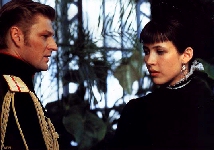 And opposit, what Sophie
Marceau said about the Anna Karenina's director: "It is extraordinary
that Tolstoy had this understanding of a woman. And Bernard had this too.
He's very brilliant, a little crazy, but he never obliged me to pretend
for him." And here Sophie comments his way of work: "Bernard never
used me as an object. He was rough at times, but honest. And that's the
best way to get a performance from an actor. It means you can use the bad
as well as the good." Then she adds, with a simplicity that disclose
the genuine poetry of her soul: "He never tried to seduce me with sweet
purpose. I love the way he treated me in the films."
And opposit, what Sophie
Marceau said about the Anna Karenina's director: "It is extraordinary
that Tolstoy had this understanding of a woman. And Bernard had this too.
He's very brilliant, a little crazy, but he never obliged me to pretend
for him." And here Sophie comments his way of work: "Bernard never
used me as an object. He was rough at times, but honest. And that's the
best way to get a performance from an actor. It means you can use the bad
as well as the good." Then she adds, with a simplicity that disclose
the genuine poetry of her soul: "He never tried to seduce me with sweet
purpose. I love the way he treated me in the films."
This role is as written just for Sophie. Her charm, elegance and gentle face and moves are right so, as Tolstoy has written about Anna Karenina in his roman. And how Sophie commented the lasting appeal of Anna Karenina? "The book is a masterpiece; the fact that people still read, feel and talk about this book shows what a classic story it is. It owes its longevity to the fact that it deals with people, people who go farther than anyone else. Yet it's so close to reality that we can recognize ourselves in all the characters."
Sophie
is adamant that the social forms may have changed, but the essential dilemma
of the character - that of a married woman who falls in love with another
man - remains the same. Marceau spent three months of the six-month shoot
in St Petersburg and it seems her experiences ware oddly heart-rending.
"I wouldn't say it was a fairytale,"
Sophie says from her Paris apartment. "St Petersburg is a magical city.
But it's very painful to see what's happening in the streets. 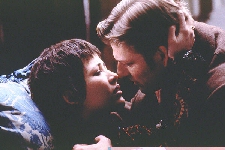 The
misery and the ruin is everywhere, it's really frightening to a Westerner,
and if you have children, and you see these families on the streets in
very desperate circumstances, it breaks your heart. So I was torn between
the two feelings. The beautiful crazy history of this culture - which is
basically 18th century Europe, and the fact that I hate this place. It's
just not livable for normal people."
The
misery and the ruin is everywhere, it's really frightening to a Westerner,
and if you have children, and you see these families on the streets in
very desperate circumstances, it breaks your heart. So I was torn between
the two feelings. The beautiful crazy history of this culture - which is
basically 18th century Europe, and the fact that I hate this place. It's
just not livable for normal people."
About
the preparation for the role of a lifetime,
Marceau was a little mysterious. "Working on a film is about concentration,
16 hours a day," she explains. "It's about not talking too much
about what you are going to do. It's about being in a certain state. Even
if you are just walking in the street, the walk must mean something. That
is the actor's job. The message must be clear in every moment." As
Anna Karenina approaches her fate, Marceau explains the character moves
deeply into herself. "It's very personal. How would you imagine your
own death? But I don't think Anna was even thinking about death. She had
gone so deep into herself, there's no way back. She's a very introverted
person. That is what is going to kill her."
"Sophie Marceau is a cool,
regal beauty -- not the right type at all to play the hot-blooded, passionate
Anna. Marceau is a good actress, but she's wrong for this role, and her
icy rendering of Anna leaves viewers largely unconcerned about the fate
of the character," says renomed critic James Berardinelli .
| SEAN BEAN |
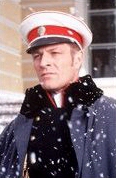 Sean
Bean was born and raised in Sheffield, Yorkshire, England, and initially
followed his father into the family welding business before joining the
Royal Academy of Dramatic Arts. There, he won the Silver Medal for his
graduation performance in "Waiting for Godot" and also received two awards
for fencing. He made his professional acting debut as Tybalt in "Romeo
and Juliet" at the Glasgow Citizens Theatre, then played Romeo for the
Royal Shakespeare Company at Stratford-Upon-Avon. Bean appeared as Lovelace
in the BBC television adaptation of "Clarissa," then achieved widespread
audience notice in the starring role of Lieutenant Sharpe on the BBC series
"Sharpe's Rifles," which is going into its fourth successful season. His
starring performance as Mellors in Ken Russell's "Lady Chatterley's Lover,"
a four-part telefilm, further enhanced his popularity.
Sean
Bean was born and raised in Sheffield, Yorkshire, England, and initially
followed his father into the family welding business before joining the
Royal Academy of Dramatic Arts. There, he won the Silver Medal for his
graduation performance in "Waiting for Godot" and also received two awards
for fencing. He made his professional acting debut as Tybalt in "Romeo
and Juliet" at the Glasgow Citizens Theatre, then played Romeo for the
Royal Shakespeare Company at Stratford-Upon-Avon. Bean appeared as Lovelace
in the BBC television adaptation of "Clarissa," then achieved widespread
audience notice in the starring role of Lieutenant Sharpe on the BBC series
"Sharpe's Rifles," which is going into its fourth successful season. His
starring performance as Mellors in Ken Russell's "Lady Chatterley's Lover,"
a four-part telefilm, further enhanced his popularity.
Among Bean's other film credits are "Caravaggio," "Lorna Doone," Mike Figgis' "Stormy Monday" and "Windprints." His television appearances include "A Woman's Guide to Adultery," "Fool's Gold," "Inspector Morse," "Prince," "Tell Me That You Love Me," "Troubles," "My Kingdom For a Horse" and "War Requiem." On stage, Bean has performed in "Fair Maid of the West," "A Midsummer Night's Dream," "Deathwatch" and "Last Days of Mankind."
"Sean is a wonderful, vital actor with a very masculine energy," says Rose. "He also -- and this is not a small thing -- looks natural and appealing in uniform. Not all contemporary actors can carry off the military carriage and demeanor that a uniform, especially an imperial Russian uniform, requires. But I had seen Sean in a British television series called 'Sharpe's Rifles,' and I knew he'd be perfect for the part of Vronsky."
Marceau said about her partner: "There is no chichi, no rivalry. He's also very much the English gentleman. Not too warm, not too distant. At night Sean stayed very quiet in his room, watching football I think. I feel I could invite him for a week to stay with me, and he wouldn't disturb me at all. He's not always talking about himself."
| ALFRED MOLINA |
Rose
said: "Fred has a unique ability to look physically big and strong at
the same time he projects the air of being lost and uncertain. I wanted
someone who was on a journey of self-discovery, who learned a lot about
people and who faced his personal demons -- but he had to be a strong and
intelligent person right from the beginning. Fred was exactly the man I
had in mind!"
Molina
about film: "So much of the story is told from Levin's point of view...
we understand Anna and Vronsky and Kitty and all the other characters through
him. What's really interesting is that Tolstoy writes in a very visual
way; he describes people physically, and those characteristics are the
real clues in terms of how you are going to play them...
...Bernard's adaptation is very pure; there are many occasions when
the characters in the film use the novel's dialogue exactly. And this is
the first time the full content of the book has been explored on film,
so I think it's a very important version of a classic work."
| MIA KIRSHNER |
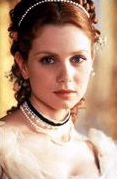 Canadian-born Mia
Kirshner (Ekaterina "Kitty" Scherbatsky) has appeared in Denys Arand's
critically acclaimed film "Love and Human Remains" as well as in Atom Egoyan's
"Exotica" and "The Crow -- City of Angels." Kirshner, who was raised in
Toronto, began acting in her teens and has studied literature at McGill
University between performing assignments. Mia Kirshner also appears in
the upcoming "Mad City," with Dustin Hoffman and John Travolta.
Canadian-born Mia
Kirshner (Ekaterina "Kitty" Scherbatsky) has appeared in Denys Arand's
critically acclaimed film "Love and Human Remains" as well as in Atom Egoyan's
"Exotica" and "The Crow -- City of Angels." Kirshner, who was raised in
Toronto, began acting in her teens and has studied literature at McGill
University between performing assignments. Mia Kirshner also appears in
the upcoming "Mad City," with Dustin Hoffman and John Travolta.
Kirshner's
opinion to film: "Since Tolstoy saw himself in Levin's character, he
also saw much of his wife, Sophie, in Kitty's character. Sophie edited
Tolstoy's work and it was almost a love letter to her -- he writes 'there
are two classes of women: all other women and then Kitty, who is in a class
of her own.' So I felt it was important to show what qualities both Tolstoy
and Levin admired in these women. Kitty really had to grow in the course
of the story."
| JAMES FOX |
"James Fox plays Karenin as a man who is obsessed with the proper and appropriate, no matter what feelings lie behind the actions. Yet, as the events of the story unfold, he emerges as a very sympathetic character. That's essential to the story I wanted to tell." says Rose and adds: "I wanted a handsome man for this part. He had to be physically attractive, because I didn't want people to think that Anna has been married to some kind of ogre. She wasn't; she had simply made the kind of marriage that most wealthy people of the time made. She had joined her future with the most successful man who proposed to her, and romantic love had nothing to do with it. I don't think she even understood how much was missing from her life until she met Vronsky."
| PRODUCTION |
Writer/director Bernard Rose says that he is glad to have encountered Anna Karenina for the first time as an adult. "When you mention this novel, everyone nods and says, 'Oh, yes, I've read it,' but when you ask them to be more specific, they admit they were supposed to read it in school, but few really did," says Rose. "When I discovered this marvelous story as an adult I could experience it as something fresh and new; it was riveting."
This classic story has been filmed many times before, most notably in the haunting 1935 version featuring Greta Garbo, and the tragic story itself is familiar.
Many
critics talk about this Anna Karenina version as about needless thirth
version because it is worst than previous.
"Of course, I saw the Garbo version, which has many wonderful moments,
but the story had a central flaw for me," Rose says. "Neither it
nor any other filmed version gave much consideration to Levin and Kitty's
part of the story; there was no parallelism, and much of the meaning
of the whole book was lost."
About 80% critics stated that Rose paints pretty pictures with his camera and his script is solid enough, but to tell Tolstoy's massive work in screen shorthand makes a certain disjointedness inevitable.
Visually, the film is dark and splendid, all clouds of white steam at frozen railway stations and women in fahabulous gowns running through the ornate, gilded rooms of palaces in 19th-century Russia. Costumes are designed by talian costume designer Maurizio Millenotti, who has been nominated for two Academy Awards, for Franco Zeffirelli's films "Othello" and "Hamlet." He began his career as an assistant to famed designers Piero Tosi and Gabriella Pescucci during the 1970s, and in 1981 became a designer in his own right.
Rose
has actually filmed on location within Russia
itself, bringing a unique touch of authenticity to the production.
The snow swept landscapes, the opulent Czarist palaces, lavish ball
rooms and the old buildings of St Petersburg add to the lavish, stunning
visual surface that captures the magnificent beauty of Russia at the height
of its imperial empire in the late 1880's. The sumptuous visuals are accompanied
by a superb and rousing score featuring the works of Russian
composers like Rachmaninoff, Tchaikovksy and Prokofiev, all beautifully
played by the St Petersburg Philharmonic Orchestra under famed conductor
Sir Georg Solti, who previously collaborated with Rose on his last film.
| CRITICS |
This film doesn't know if it's a love story set in 1800s Russia or a production and costume designers' show-reel.
| POSTERS |
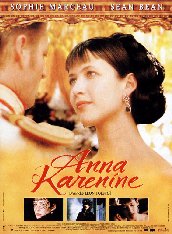
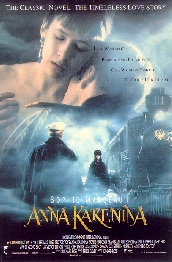
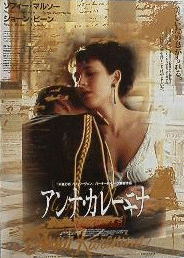
| LINKS |